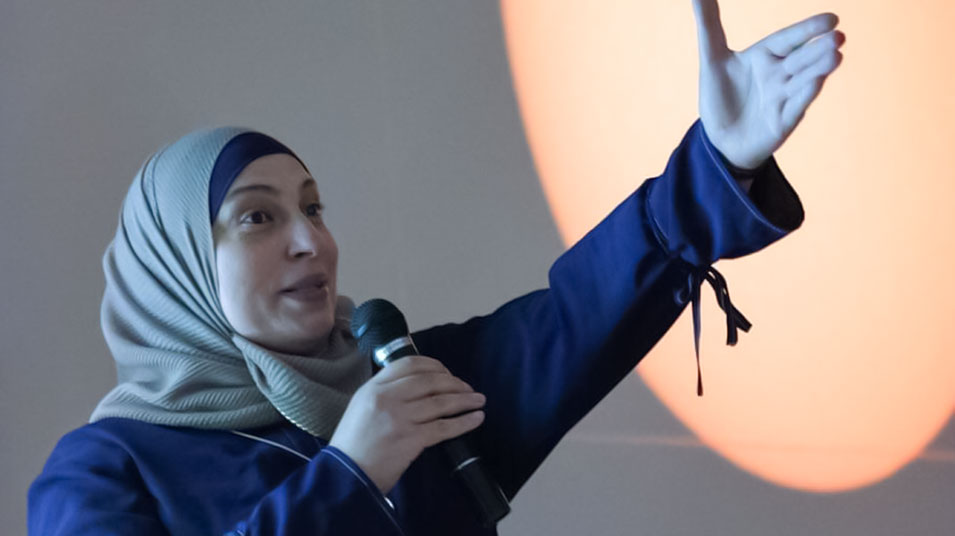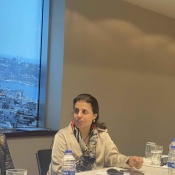Celebrating Palestine’s premier female theoretical physicist: Dr. Wafaa Khater
On July 4, 2012, researchers at the Large Hadron Collider in Geneva made one of the most important announcements in physics in recent history: they had discovered the Higgs boson, the last particle of the Standard Model of particle physics. Naturally, physicists and scientists around the world were excited about the discovery, but Birzeit University’s Dr. Wafaa Khater was more than thrilled, she was proud to have parts of her theoretical work translated into real-life discoveries.
Khater, Palestine’s premier female theoretical physicist, has spent the majority of her career studying high-energy particle physics and Higgs physics, publishing articles in world-renowned journals and establishing, and joining, joint research projects with regional and international research centers and institutions.
In honor of the 2021 UN International Day of Women and Girls in Science, we are celebrating the careers and achievements of prominent Birzeit University students, academics, and staff members who have helped bolster the careers of women in science at Birzeit and beyond. Previously, we’ve covered parts of Ghada Dushaq’s career at Birzeit University and abroad. Now, we’re highlighting Khater’s role in advancing physics research and education locally and internationally.
Khater’s fascination with physics started at a young age. She enjoyed science so much that she decided to go into the scientific stream when she graduated middle school, even though it meant that she had to take a long journey every day from her home in Ein Siniya to the only girls’ school that offers high-school science education in Ramallah.
After graduating high school with flying colors, Khater went on to enroll in Birzeit University’s bachelor’s program in physics, graduating with distinction and working for a year as a teaching and research assistant. Dr. Wael Karain, a veteran of the university’s physics department, mentored Khater and encouraged her to apply for scholarships to pursue graduate studies abroad.
Khater was accepted into the master’s degree program at the University of Bergen’s Institute of Physics and Technology (Institutt for Fysikk og Teknologi) in Norway. There, she worked with her supervisor, Professor Per Osland, on researching the two-photon decay of Higgs bosons. After finishing her degree, Osland recommended her for a Ph.D. in theoretical physics at the same institution, where she produced an excellent dissertation entitled “Top quark pair production and CP-violating Higgs sector.”
Encouraging women in science
After returning home, Khater joined Birzeit University’s Department of Physics and began teaching bachelor’s students and supervising master’s theses. She noticed a lack of research initiatives and platforms, especially for young women enrolled in academic programs in chemistry, physics, math, or even engineering.
Using her extensive academic networks and contacts with physicists and research institutions abroad, Khater worked on connecting the university’s young female scientists with international students and researchers working on similar projects.
Khater facilitated the participation of academically excellent students in CERN’s Summer Student Program; helped students pursue higher education in some of Europe’s most renowned institutions as part of the International Center for Theoretical Physics’s Physics Without Frontiers program; and helped organize the first-ever Palestinian Advanced Physics School, in which international physics professors and experts discussed recent developments with Palestinian physics students.
All of the above-mentioned partner institutions had at one point hosted Khater as a visiting researcher: she was a visiting researcher for two months at CERN’s Large Hadron Collider, a research fellow for one year at the Deutsches Elektronen-Synchrotron in Hamburg, Germany, and a research fellow for four years at the International Center for Theoretical Physics in Trieste, Italy.
Without a doubt, Khater’s efforts were successful. Arwa Bannoura, who was one of the first Birzeit University participants in CERN’s Summer Student Program, has gone on to finish a Ph.D. in experimental particle physics from the University of Wuppertal in Germany, while Tasneem Saleem, who participated in the Physics Without Frontiers program, went on to join the ATLAS Experiment at CERN.
A lasting impact
To bolster women’s role in science, Khater argues that there has to be a cultural shift in how society views the role of women. In an interview given in 2018 (in Arabic), she noted that Palestinian women generally enroll in hard-science academic programs more than their European counterparts, but the issue stems from the lack of programs designed to encourage young scientists to carry out research and figure out how best to apply it locally and internationally.
The key, Khater emphasizes, is to create a lasting impact through programs and initiatives that allow females in science to innovate and explore the limits of their fields. This can only be achieved with the cooperation of universities, civil-society institutions, and governments — something for which Khater is advocating on all levels.
Until such programs are established and institutionalized, Khater is ready to help young Palestinian women advance science and produce groundbreaking research that can be applied locally and internationally.







